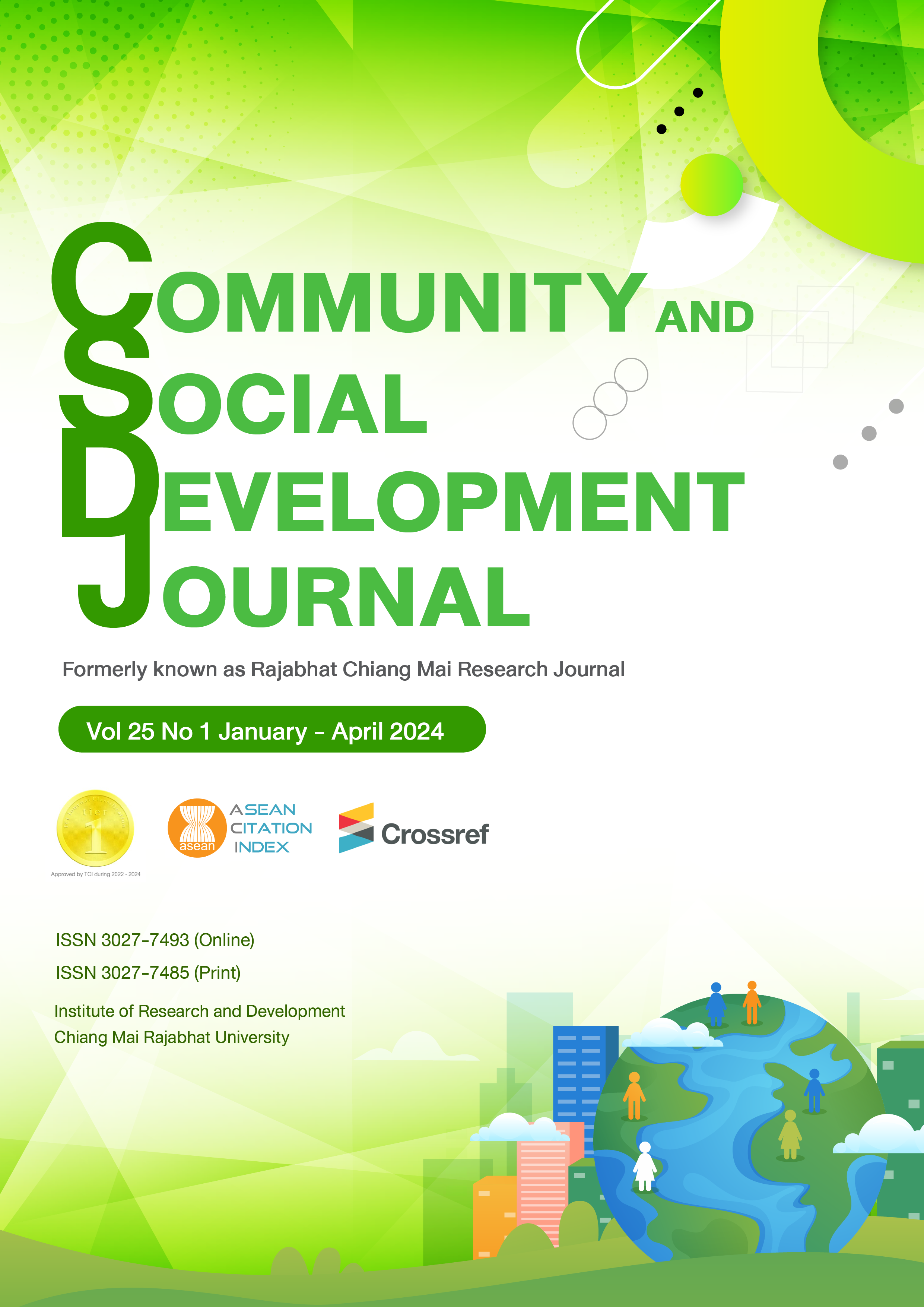Perceptions of Select Filipino Teachers on the Most Essential Learning Competencies (MELCs) of the K to 12 Curriculum
DOI:
https://doi.org/10.57260/rcmrj.2024.264463คำสำคัญ:
Teacher perception, K to 12, MELCs, COVID pandemic, Curriculumบทคัดย่อ
The effects of Covid-19 on schools have been substantial and widespread. The impact of these changes has been far-reaching, affecting students and teachers alike. Strategically, the Department of Education in the Philippines released a concise version of the K to 12 curriculum to include only the Most Essential Learning Competencies or the MELCs. In effect, the researcher determined the perception of the teachers on the MELCs. Through a survey of 173 teachers across the Country, the findings revealed that teachers moderately agreed on statements related to impression (M=2.71, SD=0.44), morale (M=2.60, SD=0.36), stress, and workload (M=2.63, SD=0.35). Lastly, there was no significant difference in the perception of teachers as to gender, gender, years of teaching experience, type of school, and academic backgrounds.
Downloads
เอกสารอ้างอิง
Brubaker, D. (2011). Curriculum Planning: The Dynamics of Theory and Practice Dale. Scott, Foresman. the University of Michigan.
Chyung, S. Y., Roberts, K., Swanson, I., & Hankinson, A. (2017). Evidence‐based survey design: The use of a midpoint on the Likert scale. Performance Improvement, 56(10), 15-23. DOI:10.1002/pfi.21727
Cochrane, S. H. & Cuevas, J. A. (2015). Teacher perceptions of the Common Core Performance Standards. Georgia Educational Researcher, 12(1), Article 1. DOI:10.20429/ger.2015.120101
Dammak, A. (2017). Exploring English Language Teachers' Perceptions of their Participation in Decision-Making on Assessment, Curriculum Development and Professional Development Activities. University of Exeter.
Department of Education. (2022). School Calendar and Activities for SY 2022-2023. Retrive from https://quezoncity.gov.ph/wp-content/uploads/2020/10/DepEd-Order-No.-34-s.-2022.pdf
Dymond, S. K., Rosenstein, A., Renzaglia, A., Zanton, J. J., Slagor, M. T., & Kim, R. (2015). The high school curriculum: Perceptions of special education and secondary education preservice teachers. Action in Teacher Education, 37(3), 284-298. DOI:10.1080/01626620.2015.1048006
El-Emadi, A. A., Said, Z., & Friesen, H. L. (2019). Teaching style differences between male and female science teachers in qatari schools: Possible impact on student achievement. EURASIA Journal of Mathematics, Science and Technology Education, 15(12), em1800. DOI: 10.29333/ejmste/109236
Gouëdard, P., Pont, B., Hyttinen, S., & Huang, P. (2020). Curriculum reform: A literature review to support effective implementation. OECD Publishing, Paris.
Hargreaves, A., & Fullan, M. (2012). Professional capital: Transforming teaching in every school. New York, NY: Teachers College Press.
Hernandez, B. (2012). Building a literate society. Inquirer.Net. Retrive from http://opinion.inquirer.net/25923/building-a-literate-society
Hicks, M. A. (2020). Keeping teachers: the factors influencing intent to stay. Ball State University.
Janko, T., & Pešková, K. (2017). Exploring Teachers’ Perceptions of Curriculum Change and their Use of Textbooks during its Implementation: A Review of Current Research. Journal of Geography Education, 17(1), 33-52. DOI:10.18452/23097
Kessler-Hopek, T. (2019). Curriculum Change: A Study on Teacher Perceptions of Curriculum Change on Content Standards. Columbus State University.
Kisa, Z., & Correnti, R. (2015). Examining implementation fidelity in America’s choice schools: A longitudinal analysis of changes in professional development associated with changes in teacher practice. Educational Evaluation and Policy Analysis, 37(4), 437-457. DOI:10.3102/0162373714557519
Konokman, G. Y., Yelken, T. Y., Karasolak, K., & Cesur, E. (2018). Teachers’ perception: Competent or not in curriculum development. MOJES: Malaysian Online Journal of Educational Sciences, 5(4), 56-73. https://ejournal.um.edu.my/index.php/MOJES/article/view/12519/8088
Lacerda, C. C., & Sepel, L. M. N. (2019). Basic school teachers’ perceptions about curriculum theories. Educação e Pesquisa, 45, e197016. DOI:10.1590/S1678-4634201945197016
McKeown, D., Brindle, M., Harris, K. R., Sandmel, K., Steinbrecher, T. D., Graham, S., Lane, K. L., & Oakes, W. P. (2019). Teachers’ voices: Perceptions of effective professional development and classwide implementation of self-regulated strategy development in writing. American Educational Research Journal, 56(3), 753-791. DOI:10.3102/000283121880414
Miller, J. P., & Seller, W. (1985). Curriculum Perspectives and Practice. Longman Inc., 95 Church Street, White Plains, NY 10601.
Montebon, D. R. (2022). Teaching and technology: a transcendental phenomenology of select filipino teachers’experiences in the new normal. Journal of education naresuan university, 24(2), 12-25. https://so06.tci-thaijo.org/index.php/edujournal_nu/article/view/252934
Montebon, D. T. (2014). K12 science program in the Philippines: Student perception on its implementation. International Journal of Education and Research, 2(12), 153-164. https://www.ijern.com/journal/2014/December-2014/15.pdf
Nadelson, L., Briggs, P., Bubak, K., Fuller, M., Hammons, D., & Sass, M. (2012). The tensions between teachers accountability and flexibility: The paradox of standards-based reform. Teacher Education and Practices, 25(2), 196-220. https://scholarworks.boisestate.edu/cifs_facpubs/103
Nevenglosky, E. A., Cale, C., & Aguilar, S. P. (2019). Barriers to Effective Curriculum Implementation. Research in Higher Education Journal, 36, EJ1203958. https://files.eric.ed.gov/fulltext/EJ1203958.pdf
Porter, R. E., Fusarelli, L. D., & Fusarelli, B. C. (2015). Implementing the Common Core: How educators interpret curriculum reform. Educational Policy, 29(1), 111- 139. DOI: 10.1177/08959048145592
Richter, E., Brunner, M., & Richter, D. (2021). Teacher educators’ task perception and its relationship to professional identity and teaching practice. Teaching and Teacher Education, 101, 103303. DOI: 10.1016/j.tate.2021.103303
Sarı, M., & Başarır, F. (2016). Analyzing teachers’ perceptions of “female teacher” and “male teacher” within traditional gender roles, International Journal of Education and Research, 4(3), 205-224. https://ijern.com/journal/2016/March-2016/16.pdf
Vähäsantanen, K., & Eteläpelto, A. (2011). Vocational teachers’ pathways in the course of a curriculum reform. Journal of Curriculum Studies, 43(3), 291-312. DOI: 10.1080/00220272.2011.557839
Zara, C. G., Balazon, F., Wangdi, T., Perales, W. F., Praditson, P., & Ulla, M. B. (2022). Exploring the concept of pedagogical resilience during the COVID-19 pandemic: Teachers’ perspectives from Thailand and the Philippines. In Frontiers in Education 7, 981217. DOI:10.3389/feduc.2022.981217
ดาวน์โหลด
เผยแพร่แล้ว
รูปแบบการอ้างอิง
ฉบับ
ประเภทบทความ
สัญญาอนุญาต
ลิขสิทธิ์ (c) 2024 วารสารวิจัยราชภัฏเชียงใหม่

อนุญาตภายใต้เงื่อนไข Creative Commons Attribution-NonCommercial-NoDerivatives 4.0 International License.
1. บทความ ข้อมูล เนื้อหา รูปภาพ ฯลฯ ที่ได้รับการตีพิมพ์ใน “Community and Social Development Journal” ถือเป็นลิขสิทธิ์ของ Community and Social Development Journal มหาวิทยาลัยราชภัฏเชียงใหม่ และเพื่อให้เผยแพร่บทความได้อย่างเหมาะสมผ่านสื่อสิ่งพิมพ์และอิเล็กทรอนิกส์ ผู้เขียนยังคงถือครองลิขสิทธิ์บทความที่ตีพิมพ์ภายใต้ใบอนุญาต Creative Commons Attribution (CC BY) ซึ่งอนุญาตให้เผยแพร่บทความซ้ำในแหล่งอื่นได้ โดยอ้างอิงต้องอ้งอิงบทความในวารสาร ผู้เขียนต้องรับผิดชอบในการขออนุญาตผลิตซ้ำเนื้อหาที่มีลิขสิทธิ์จากแหล่งอื่น
2. เนื้อหาบทความที่ปรากฏในวารสารเป็นความรับผิดชอบของผู้เขียนบทความโดยตรง ซึ่งกองบรรณาธิการวารสารไม่จำเป็นต้องเห็นด้วยหรือร่วมรับผิดชอบใดๆ














